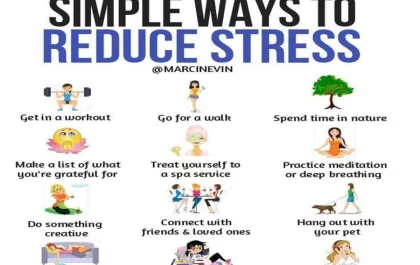Simple Ways to Reduce Stress: Are you feeling stressed? Take ten notes and try one of the activities below to reduce stress.
Table of Contents
1. Exercise
It’s a cliché for a reason: exercise causes your body to release feel-good hormones like endorphins, which can help you feel less strained. Although stress can also cause you to tighten muscles, that exercise can help to relax subconsciously.
It doesn’t have to be an entire workout: walk around the block, do 20 jumping jacks, go for a quick run, or find a 10-minute yoga flow on YouTube to watch.
2. Organize
Feeling overburdened by the amount of work that has to be done or the deadlines that must be reached can lead to stress. Making a to-do list or using a time management technique will assist you in staying focused on finishing each assignment.
Take a seat and list all of the things you need to get done, along with the steps you need to take to do each assignment. Sort tasks according to priority, then decide which ones you can put off or delegate to someone else. Tell the truth about how long you will need to finish each task, and leave time in your plan to treat yourself after you finish it.
3. Breathe
Stress and anxiety can touch how you breathe, which affects how your body and mind feel. Taking a few deep sniffs can help slow your living and heart rate, relax your muscles, and calm your mind.
Follow Anxiety Australia’s guide to slowing anxiety breathing or go to xhalr.com, which has a visual breathing tool to help you calm your breath quickly.
4. Take a time out – Stressed Find Now

Even though you’re not a baby, there are situations when taking a timeout is still appropriate. Stress can impact our feelings, our behavior, and our physical and mental health, just like it can with kids. Stress, for instance, can easily agitate or irritate you.
It might be time to take a break and give yourself some alone time if you begin to notice that stress is having an adverse effect on your emotions or behavior. Instead, find a reliable friend or coworker with whom to share your feelings, or engage in something you enjoy doing, such reading a book or listening to music.
Time constraints don’t have to be reactive; instead, proactively incorporate “time that works for you” into your weekly plan so that you can make time for activities.
Also Read: Essential Beauty Products – Products, Introduction, And More.
5. Meditate
Now is a great time to try mindfulness, meditation, or relaxation activities if you haven’t already. These methods are beneficial both while you’re under stress and as preventative measures for overall health. They have been scientifically shown to help decrease and manage stress and boost mental well-being.
Why you should reduce stress
While some stress is daily and can help you function more effectively in times of pressure, the continued focus is unsuitable for your physical or mental health. From causation headaches and sleep loss to affecting hormone function, blood pressure, and relationships, there are many reasons why experts warn of the ill effects of the current “stress epidemic” on public health.
While it’s not a truthful goal to plan how to avoid all stress, proactively taking the above actions can help you avoid unnecessary stress and better manage stress when it strikes.
When you should get help
Ongoing stress affects your mental health and may be worth visiting the doctor. You should see your GP if you are unwell or ‘not yourself’ for two weeks or more. Remember: you don’t have to wait for a crisis to seek mental health help.
Conclusion
Worry is a part of a lifetime for everyone, and this previous year has been extra stressful for many. But by taking steps to achieve your stress proactively, you can help ensure that your daily worries don’t end up hurting your health.
Also Read: What is the Realty International Lifestyle?
Related posts
Featured Posts
Airbnb San Diego County, CA – Holiday Rentals in San Diego
Introduction Airbnb is a online business company that connects marketplaces for holiday rentals, homestays, experience and amazing locations This company…
Simple Ways to Reduce Stress
Simple Ways to Reduce Stress: Are you feeling stressed? Take ten notes and try one of the activities below to…


